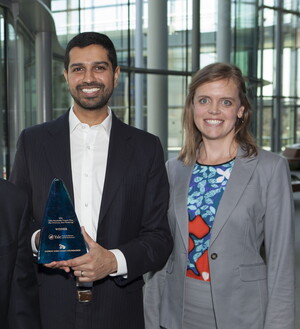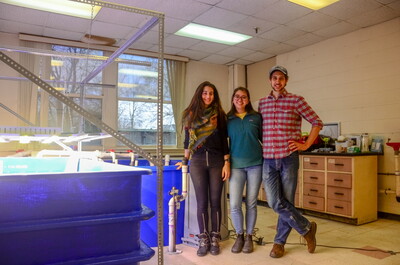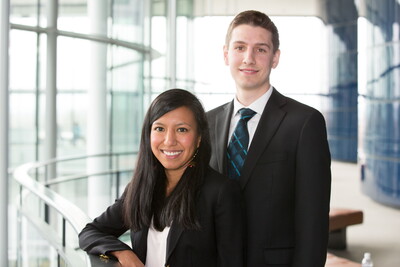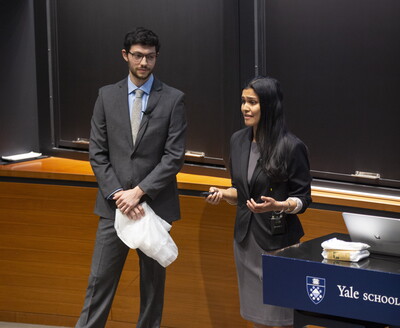From Cricket Protein to Biodegradable Ponchos
Checking in with past Sabin Sustainable Venture Prize Winners
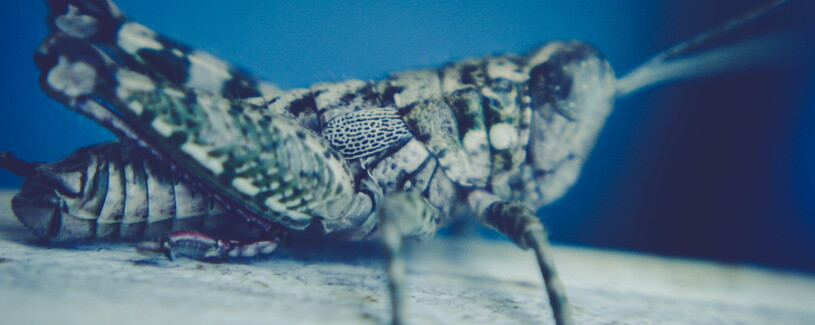
“Starting and running the business taught me so many lessons that couldn’t have been learned any other way. I’ve taken those lessons into my career now running a business unit in a related industry, and have really had a lot of growth opportunities as a result of having started Poda Foods.”
-Kenny Cloft, Poda Foods Co-founder (Sabin Winner 2015)
In anticipation of this year’s upcoming Sabin Sustainable Venture Prize pitch competition, CBEY's Entrepreneurship and Innovation team checked in with past winners of the Sabin Prize to see how their ventures have transformed since graduating from Yale, and how it influenced their trajectory.
We spoke with the founders of Green Gear Supply Company (Russell Heller YC ‘19 & Monika Dharia, Duke ‘19, Sabin 2019), Symbrosia (Alexia Akbay, YSPH ‘19, Sabin 2018), Renewal Mill (Claire Schlemme F&ES ’11, Sabin 2016) and Poda Foods (Yesenia Gallardo F&ES ’15 and Kenny Cloft F&ES ’15, Sabin 2015). They talked about their early days in the seed stage, how they approached scaling up and using lessons learned to pivot into new fields.
CBEY: Tell us about your venture.
Symbrosia: Symbrosia is a startup located in Kona, Hawaii, scaling the production of a specific tropical red macroalgae as a livestock feed additive which can yield over 80% in methane reductions.
Green Gear: We sell bioplastic rain ponchos and plan to expand into other bioplastic or plastic alternative products as we grow.
Poda Foods: Poda Foods was an edible insect company. We raised food-grade crickets and processed them into cricket protein powder, which was then sold to businesses making insect-based foods (cookies, chips).
(F&ES/SOM ’16) co-founders of Renewal Mill
and winners of the 2016 Sabin Prize.
Renewal Mill: Renewal Mill is a next-generation ingredients company that upcycles byproducts from food manufacturing into premium ingredients and products. Renewal Mill is building a new circular economy of food that is better for people and the planet. I was first inspired to begin the company after coming face-to-face with food waste at my previous venture, Mother Juice. Juicing results in a tremendous amount of nutritious byproduct that is often wasted. When I met the owner of a tofu factory who told me about his own byproduct challenges with okara (soybean pulp), I saw an opportunity for creating a new class of novel, upcycled ingredients.
CBEY: What was your inspiration to start?
Alexia Akbay (YSPH '19) in Symbrosia's new office space
Sybrosia: We are inspired by seaweed’s potential to uptake CO2, bioremediate ocean water, and produce important secondary metabolites. After coming across research out of Australia demonstrating the potential of Asparagopsis taxiformis for methane reduction, we knew we wanted to drive forward the sustainable commercial production of the crop. We initially applied for CBEY’s Climate Change Seed Grant which fueled our path towards becoming the operating business we are today.
Green Gear: Monika and I both care deeply about environmental issues like climate change and plastic pollution. Seeing how surprisingly pervasive poncho use is, from hiking to sporting events to admissions office tours, Monika recognized that there was an opportunity to affect positive change by creating a business.
Poda:
Yessenia: We wanted to create a venture that focused on creating meat alternatives with a lower environmental footprint. It was inspired partly by my family’s background—they are from Oaxaca, Mexico where grasshoppers, ants, and other insects are commonly consumed—and from deep concerns about industrial meat production and the need to find sustainable alternatives.
Kenny: we were both passionate about using business to drive positive change in the world, and saw this venture as a great way to put that into practice. I think you can see that same idea in our careers after Poda and the ventures we’ve pursued.
CBEY: Tell us more about your venture’s trajectory after graduation.
Symbrosia: We raised a seed round and joined an aquaculture accelerator in Hawai’i. These two changes afforded us the necessary facilities to streamline our R&D process and hire additional experts that were missing from our core team.
Green Gear: We are continuing to grow and develop the business. We are shifting production to a new factory and fulfilling our first large orders this spring. We have attended conferences and built a network of potential customers that we can work with once our production is a bit more stable and reliable.
Kenny Cloft (F&ES’15), winners of 2015 Sabin Prize
Poda:
Yessenia: Kenny and I worked on the venture for three years and launched a real farm outside of Portland, Oregon. It was a huge learning experience for us. We built a very strong network of supporters in the Portland ecosystem and received small amounts of funding, however, in the end, we struggled with operations and we learned a lot of hard lessons: you need a well-rounded team.
Kenny: We got rolling and opened an office and farm in Portland, OR. Eventually, we closed the business as we struggled to really get over the hump of operationalizing our ideas with limited resources. I think we hit a point where we really needed to grow our team and bring in other contributors, but we had experienced so much early success with just the two of us and our networks that we didn’t realize that until it was too late. Practically, I learned so much about finance, venture capital, networking, public speaking, marketing, science, legal aspects of starting a business, the list goes on… I would point to starting Poda as my most important educational experience, and I don’t consider closing the business a failure. We achieved a lot and learned so much, and drove our careers forward in a way that I certainly did not anticipate when we first started planning the business in Yesenia’s kitchen in New Haven!
The Sabin Prize allowed us to go from an exciting idea to an actual venture. When we moved into our new office in Oakland a year ago, one of the first things we put up in the space was our Sabin award!
-Claire Schlemme, Renewal Mill Co-founder (Sabin winner 2016)
Renewal Mill: It's been four years since we started the company and we're still going! After focusing on developing the business model and the technology for ingredient production, we've moved to building our ingredient sales pipeline and launching our own branded product line in the Bay Area (and online!). We learn new things every day - whether from a deep dive into the world of food production quality assurance or from researching packaging design and data-driven sales strategies.
CBEY: How did winning the Sabin Prize influence your career or venture post-Yale?
Symbrosia: The Sabin Prize provided funding for us to build the first prototype, gain visibility from our now important partners, and conduct additional market research to better identify our product-market fit. We were essentially investor-ready as a result of this funding.
Green Gear: The grant enabled us to make investments in inventory, testing, trademarking, etc. that we otherwise would have been unable to make without applying for other grants or seeking private funding.
Poda:
Yessenia: In the end, it was one of the most valuable experiences I’ve ever had and positioned me on a new path working in finance (as a Principal at an investment advisor). More importantly, it was the start of my entrepreneurial journey. I’ve since started two other small business ventures in the food space and know I’ll never stop. I am sure that I’ll go back to my entrepreneurial roots (it’s in my blood now!) and build a large, scalable venture in the next few years.
Kenny: We were really unsure about whether or not to take the leap and really launch the business until we won the Sabin prize. Winning the prize gave us the validation that we had a good idea on our hands and gave us significant financial support to get the business started. Starting and running the business taught me so many lessons that couldn’t have been learned any other way. I’ve taken those lessons into my current career running a business unit in a related industry, and have really had a lot of growth opportunities as a result of having started Poda Foods.
Renewal Mill: Winning the Sabin Prize made Renewal Mill possible. The Sabin Prize allowed us to go from an exciting idea to an actual venture. When we moved into our new office in Oakland a year ago, one of the first things we put up in the space was our Sabin award!
CBEY: What advice would you give to aspiring social entrepreneurs at Yale?
Symbrosia: Team and people are the centers. Starting out with cofounders that have separate, relevant expertise will be invaluable to long term success. Don’t be afraid to solve a nuanced problem that seems impossible, just make sure to keep a focus and minimize complexity as you go. Celebrate your wins but don’t become complacent of slow development. Collaborate with your competitors.
Russell Heller (YC ‘19) & Monika Dharia (Duke ‘19)
Green Gear: Don’t waste time planning or waiting for the right moment, just bring your ideas forward for feedback and be aggressive if you are passionate about a solution to a problem or environmental/social issue. The only way you can have an impact is by testing yourself and attempting to create solutions.
Poda:
Yessenia: Take the risk. We hemmed and hawed for so long about actually launching and in the end, I’m so glad we did, even though we failed. Best thing I ever did. Also, don’t get an MBA, just launch a business!
Kenny: I think the success that we had was from staying humble and really putting a lot of time, energy, and passion into our project. We never felt like we could know enough about what we were working on and so we consulted as many experts as we could to help shape our work and our thinking. We really focused on building a strong network and leaning on that support to help us in every way possible as we tried to get the business off the ground. You really can't start a business on your own, and you can never be fully prepared for all the challenges and work that you are going to have to take on. But you can prepare, gather resources, and get help from those around you to give your business its best chance at success.
Renewal Mill: Never underestimate the power of community. Building a network of trusted advisors, mentors, and fellow entrepreneurs has provided us with an invaluable resource as we navigate challenges and search for opportunities.
